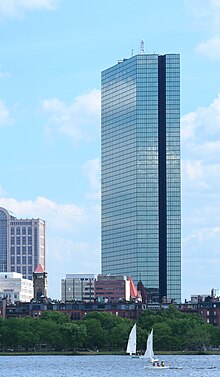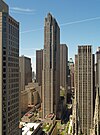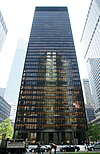Twenty-five Year Award
| Twenty-five Year Award | |
|---|---|
 The John Hancock Tower, the most recent recipient of the award | |
| Description | Long-term excellence in American architecture |
| Country | United States of America |
| Presented by | American Institute of Architects |
| First awarded | 1969 |
| Website | Official homepage |
The Twenty-five Year Award is an architecture prize awarded by the American Institute of Architects (AIA) to buildings and structures that have "stood the test of time for 25 to 35 years",[1] and that "[exemplify] design of enduring significance."[2] The project receiving the award can be located anywhere in the world, but must be designed by an architect licensed in the United States. The Twenty-five Year Award was first presented in 1969, and has been handed out every year from 1971 onward; the most recent winner, in 2011, was the John Hancock Tower, in Boston, Massachusetts.[1]
Buildings to which Eero Saarinen has contributed have received six awards, while buildings designed by Skidmore, Owings & Merrill and Louis I. Kahn have each been honored five times. Buildings by Frank Lloyd Wright have received this award four times, and Ludwig Mies van der Rohe has been honored for three of his buildings in the United States. Of the 41 projects that have received this award, only two, Eames House and the Vietnam Veterans Memorial, had women as contributing architects.
Eligibility
The Twenty-five Year Award can be awarded to any type of architectural project and may be either a single structure or a group of structures that compose a larger whole.[3] Past examples of projects winning the award in this way include both monuments, such as the Gateway Arch and Vietnam Veterans Memorial, and groupings of buildings, such as the Salk Institute for Biological Studies and Haystack Mountain School of Crafts. Most buildings nominated for this award are new structures but one winner, Faneuil Hall Marketplace, was a substantial renovation of warehouses into a festival marketplace.[4]
For a project to be eligible to win the Twenty-five Year Award, it must have been built between twenty-five and thirty-five years before the year of the award. It must also have been designed by "an architect licensed in the United States at the time of the project’s completion." This means that the award canidate can be anywhere in the world, but must have been designed by a licensed American architect, such as the Fundació Joan Miró in Spain.[3]
To be nominated the project must be in a "substantially completed form" as well as "in good condition". Potential candidates must not have been altered substantially since they were built. Change of use is allowed by the rules, but the "original intent" of the structure must still be intact.[3] These changes of use include reorganization of interior space. This was taken into account with the Price Tower, which when built was a mix of offices and apartments, but when awarded, had only one apartment remaining.[5] The award is presented at the AIA National Convention each year.[1]
Nomination procedure
"Any AIA member, group of members, component, or Knowledge Community" is allowed to nominate a project for the Twenty-five Year Award. A project may be nominated multiple times, as long as it still complies with the eligibility requirements. Nominees are judged by today's architectural standards in their function, execution, and creativity. The project and its site are judged together, with any changes in context taken into account.[3]
Award recipients
† The "Year awarded" column states the year the award was handed out and has a link to an article about the significant architectural events that year.
See also
References
- General
- Twenty Five Year Award Recipients. American Institute of Architects. Retrieved April 8, 2011.
- Specific
- ^ a b c John Hancock Tower in Boston selected to receive AIA Twenty-five Year Award. Archinnovations. January 19, 2011. Retrieved April 9, 2011
- ^ Haystack school to receive architecture award. Bangor Daily News. December 10, 1993. Retrieved July 1, 2011.
- ^ a b c d Twenty-Five Year Award. American Institute of Architects. Retrieved April 9, 2011.
- ^ Campbell, Robert. Two urban drawing cards are now in limbo. The Boston Globe. December 21, 2008. Retrieved July 1, 2011.
- ^ AIA honors Wright tower. Milwaukee Journal. May 8, 1983. Retrieved July 1, 2011




































